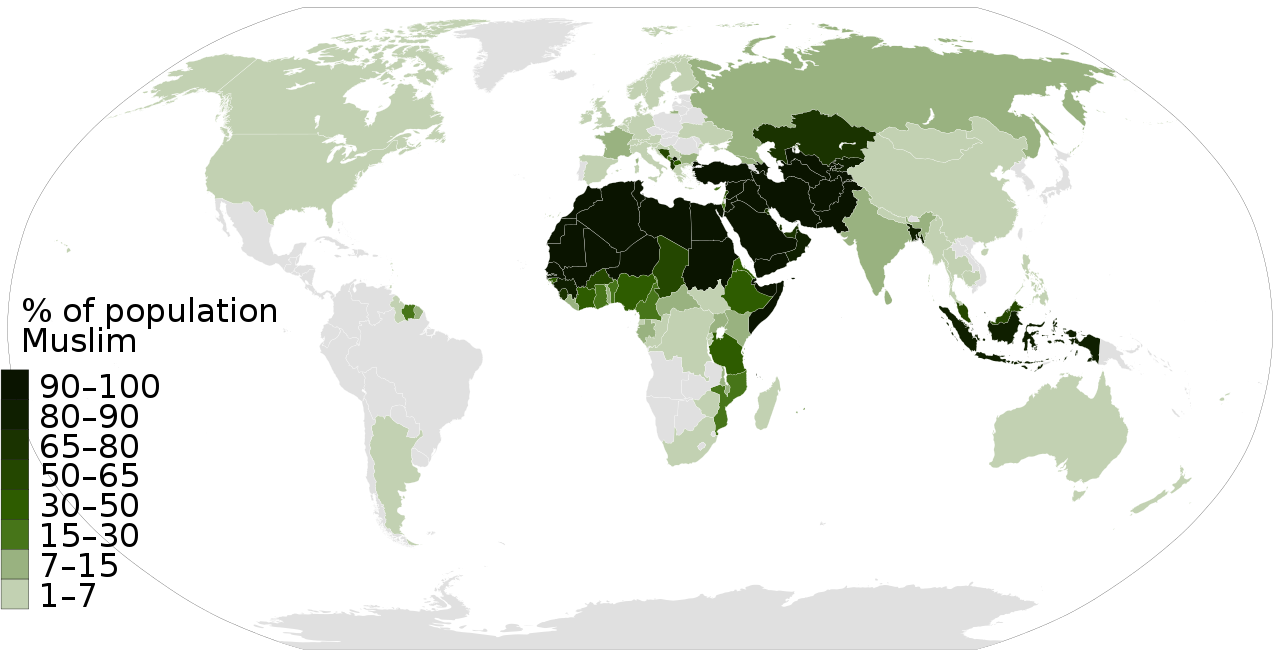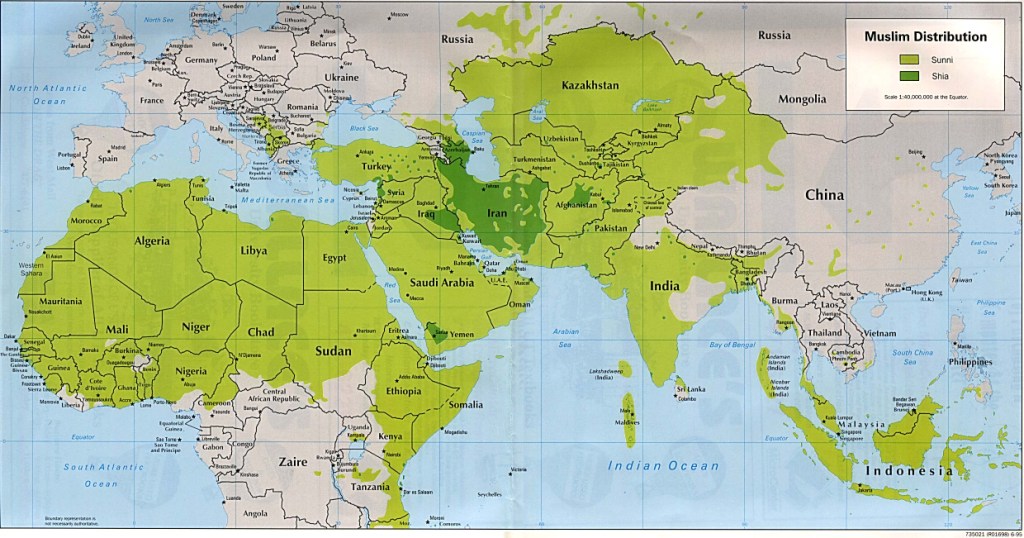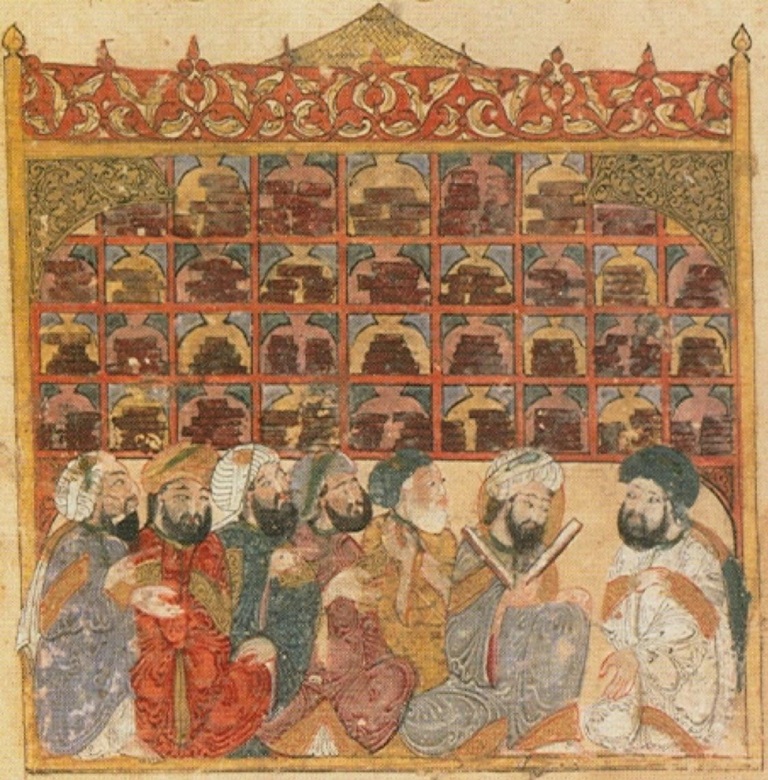Islam
The world Islam means "submission to the will of God". It is an Abrahamic monotheistic religion centered primarily around the Quran, a religious text that is considered by Muslims to be the direct word of God as it was revealed to Prophet Muhammad, the main and final Islamic prophet. Islam started in Mecca, in modern-day Saudi Arabia, during the time of the Prophet Muhammad’s life in the 7th century. Today, the faith is spreading rapidly throughout the world with more than two billion followers comprising around 25 percent of the global population. It is the world's second-largest religion behind Christianity.
This is a map from Pew Research showing the population of Muslims in the world:

In addition to the Quran, Muslims also rely for guidance on a collection of documents called "Ḥadīth," which is considered the second pillar of Islam after the Quran. These are some of the beliefs of Muslims:
(1) Unity of God: There is only one God, and is called Allah. Allah is not a Trinity, which is different from Christian's concept of God. Muslims also deny the deity of Christ.
(2) Divine attributes: In Islam, Allah is referred as one with many divine qualities and attributes.
(3) Rabb: The Quran uses the title "rabb" for Allah in a verse: "All praise and gratitude is due to Allah (God), Rabb (Lord and Master) of all the worlds and Universe." Muslims believe that Allah takes care, nourishes, fosters through every stage of existence, in which everything between that exists.
(4) Rahman and Rahim: These two words can be translated as Beneficent and Merciful, respectively. They are applicable to two different states of the exercise of mercy by God. The first word refers to the state when man has not done anything to deserve mercy and God exercise his unbounded mercy in bestowing his gifts on him.The second word refers to that when man does something to deserve his mercy, and his mercy is therefore repeatedly exercised for him. It is Rahman that creates for man all those things which make his life possible on earth, and Rahim that gives him the fruits of his labor.
(5) Ghafur: Ghafur can be translated as Forgiver. God’s forgiveness towards man is not limited by any consideration. The sins may be few or many and the sinful one may be a Muslim or a non-Muslim. Even if man is not worthy of being forgiven, yet God can exercise the quality of forgiveness towards him.
(6) Day of Resurrection and Final Judgement: Life after final judgment has two forms: a life in paradise for those in whom the good preponderates over evil, and a life in hell for those in whom evil preponderates over good.
(7) Divine predestination: Muslims believe that every matter, good or bad, is believed to have been decreed by God. Muslims often express this belief in divine destiny with the phrase "Insha-Allah" meaning "if God wills" when speaking on future events.
This is the word "Allah" in Arabic calligraphy: 
During the time of Muhammad he established a Muslim community. By the time he passed away in 632 CE, he had conquered Arabia and most people there converted to Islam. His successors greatly expanded territories under Islamic control and ruled them as caliphates. More people were converted to Islam. Below is a map showing the expansion of the territories up to the Umayyad Caliphate:


In about 100 years after the demise of Muhammad in Medina, Arabia, his successors had established an empire that, to its west, occupied north Africa and Spain, and to its east, reached India subcontinent. It should be noted that the expansion of territories helped to spread Islam, but people converted to Islam even without being ruled by Caliphates. For example, Malaysia and Indonesia were not ruled by the Caliphates, yet people there converted to Islam.
An important event happened during the first four Caliphs that led to the separation of Sunni and Shi'a sects in Islam. Some of conflicts in the Middle East today are a result of conflicts between these two sects.
The difference between Sunni and Shi'a Muslims began as a political question in Islam’s early history. After Prophet Muhammad died the community needed to decide who became the leader of the Muslim community. Sunnis believe that Muhammad did not explicitly designate anyone to become the ruler after it. Shi'a Muslims, based on a ḥadīth report concerning Muhammad's pronouncement at Ghadir Khumm, believe that Alī ibn Abī Ṭālib, Muhammad's cousin and son-in-law, should have been the designated successor to Muhammad as Islam's spiritual and political leader. This belief later developed into the concept of Imamah, the idea that certain descendants of Muhammad, the Ahl al-Bayt, are rightful rulers or Imams, whom Shīʿa Muslims believe possess special spiritual and political authority over the Muslim community.
Many Muslims believe that Abu Bakr was most fit to lead the Muslim community. They believe that he was the ablest and closest to Muhammad. This group came to be known as the Sunnis (followers of the “Sunna” or the way of the Prophet). Shi'a Muslims, relying on a ḥadīth report, believe that the leader should have been Ali. Ali himself was not dissatisfied with the decision for Abu Bakr to be the ruler, but some remained dissatisfied. Abu Bakr was the first caliph, and Ali eventually became the fourth. The theological differences between the two groups came partly from this political difference.
Today, less than 15% of Muslims worldwide are Shi'as. Iran is considered the center of Shi'a Islam -- Shi'a Muslims consist of about 90% of the country's population and about 38% of the worldwide Shi'a population. Other countries with Shi'a majority are Azerbaijan, Bahrain and Iraq. Below is a map showing Sunni (light green) and Shi'a (dark green) countries:

The end of the Umayyad Caliphate led to the Abbasid Caliphate (750-1258 CE), which started the Islamic Golden Age. This period is traditionally associated with the inauguration of the House of Wisdom in Baghdad around 780 CE (exact date not entirely certain), the world's largest city by then, where Muslim scholars and polymaths from various parts of the world with different cultural backgrounds gathered to translate all of the known world's classical knowledge into Arabic and other languages. Soon, other similar libraries were built in other parts of the Islamic territories. Below is a painting of scholars in a library drawn by an Islamic artist in 1237.

The various Quranic injunctions and Ḥadīth, which place values on education and emphasize the importance of acquiring knowledge, played a vital role in influencing the Muslims of this age in their search for knowledge and the development of the body of science. Also, several caliphs heavily patronized scholars. The best scholars and notable translators had salaries that are estimated to be the equivalent of professional athletes today.
During this period, the Muslims showed a strong interest in assimilating the scientific knowledge of the civilizations that had been conquered. Many classic works of antiquity that might otherwise have been lost were translated from Greek, Syriac, Middle Persian, and Sanskrit into Syriac and Arabic, some of which were later in turn translated into other languages like Hebrew and Latin.
The society was also tolerance of people of other faiths. Adherents of the Church of the East, a branch of Christianity, contributed to Islamic civilization by translating works of Greek philosophers and ancient science to Syriac and afterwards to Arabic. They also excelled in many fields, in particular philosophy, science and theology. For a long period of time the personal physicians of the Abbasid Caliphs were often Assyrian Christians. Many of the most important philosophical and scientific works of the ancient world were translated, including the work of Galen, Hippocrates, Plato, Aristotle, Ptolemy and Archimedes.
The Islamic Golden Age contributed greatly to mathematics, natural sciences, medicine, and art. Even today we are benefited by some of the scholars' discoveries. For example, Muḥammad ibn Mūsā al-Khwārizmī (780-847 CE) is credited as the founder of algebra. David Kahn, who wrote extensively on the history of cryptography and military intelligence, notes in his "The Codebreakers" that modern cryptography originated among the Arabs (note: cryptography is widely used in today's Internet). Abu Yūsuf Yaʻqūb ibn ʼIsḥāq aṣ-Ṣabbāḥ al-Kindī (801-873 CE) together with al-Khalīl ibn Aḥmad (717–786 CE) are considered fathers of modern cryptography. Similarly, Al-Zahrawi (936–1013 CE) is often referred to as the father of surgery.
The House of Wisdom was destroyed by the Mongols in the Siege of Baghdad in 1258. Many people consider this year as the end of the Islamic Golden Age. As the Mongolian army swept across Central Asia and Iranian plateau to reach eastern Europe, most of the Islamic empire was destroyed (although part of it was rebuilt later). But Islam continues to spread. It is still one of the fastest growing mainstream religions today.